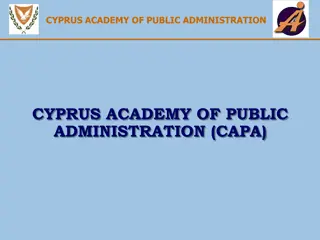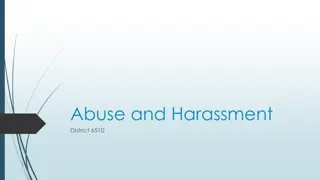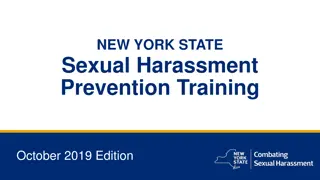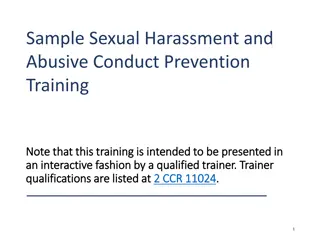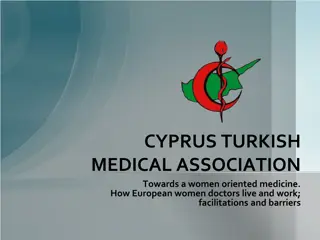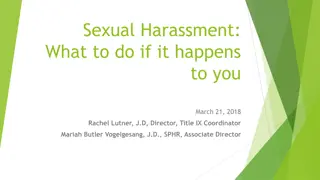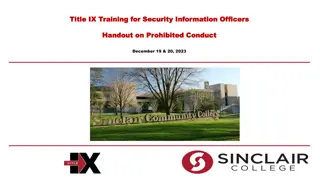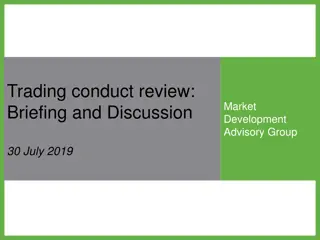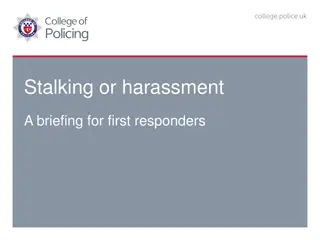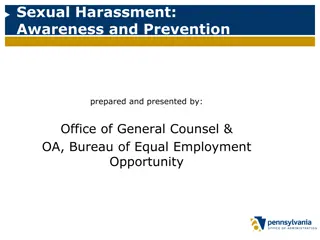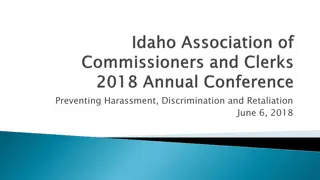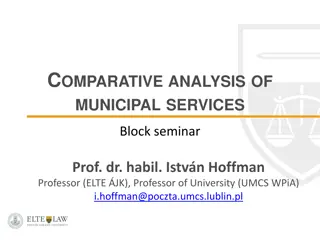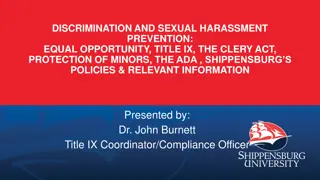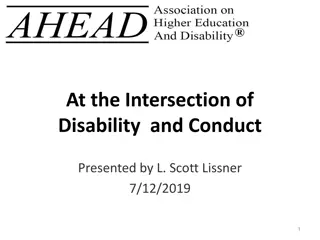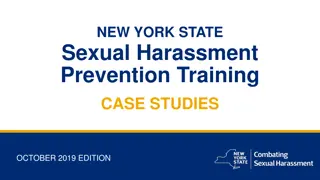Code of Conduct on Preventing and Combating Harassment in Public Services - Cyprus Case Study
The Code of Conduct on Preventing and Combating Harassment in Public Services in Cyprus, led by the Commissioner for Administration and the Protection of Human Rights Despina Mertakka, focuses on promoting equality and combating discrimination. This initiative includes drafting codes of practice, implementing strict procedures for addressing harassment, and providing training to public sector employees. Despite challenges such as initial reluctance and gender stereotypes, efforts are being made to educate and empower individuals to address and report incidents of harassment.
Download Presentation

Please find below an Image/Link to download the presentation.
The content on the website is provided AS IS for your information and personal use only. It may not be sold, licensed, or shared on other websites without obtaining consent from the author. Download presentation by click this link. If you encounter any issues during the download, it is possible that the publisher has removed the file from their server.
E N D
Presentation Transcript
Code of Conduct on Preventing and Combating Harassment and Sexual Harassment in Public Services Commissioner for Administration and the Protection of Human Rights Cyprus Despina Mertakka Officer A
Good Practice as an Equality duty As Equality Body, we have the mandate (among others) To draft Codes of Practice and advise on good practices To promote equality in the enjoyment of human rights and liberties To take all appropriate measures to ensure compliance with the national anti discrimination legislation
Role of the EB Cyprus Ombudsman conceptualise the need to draft a Code of Conduct on Preventing and Combating Harassment and Sexual Harassment in Public Service. Once, the Code was drafted, it was approved by the Council of Ministers in July 2018 as a binding decision for the public services to comply with its content and to cooperate for the implementation of the Code. The Code was published in January 2019. The Code clearly identifies that harassment and sexual harassment discrimination on grounds of gender in the workplace, in employment and vocational training constitute It underlines two crucial aspects: 1. The importance to prevent this phenomenon and 2. The obligation to ensure that a strict procedure is followed when complaints are submitted by victims.
The Code The Code states that, each public authority should designate an Equality Committee, as soon as possible, in order to proceed with the training of the members of the Committees. Since January 2019, our EB, in cooperation with the Cyprus Academy of Public Administration, started 2 types of trainings: a general training to inform employees in the public sector about the Code of Conduct and a specialized training for the members of the Equality Committees.
Key Challenges Initial reluctance of the heads / executives of public services to engage to the trainings due to their belief that these incidents do not occur to their workplace The stereotypical/ traditional perceptions that exist in Cypriot society in relation to social roles of men and women - A masculine culture that permits/perpetuates sexual harassment Fear of retaliation against victims However, we tried to overcome these challenges The persistence of our Office to keep organizing the trainings to train employees on their rights and on how they should respond to and report harassment incidents Challenge the gender stereotypes Proper information of victims to feel secure and safe to report the incidents
Sanctions The article 12(4) of The Equal Treatment of Men and Women in Employment and Vocational Training Law 205(I)2002 stipulates that: "Employers (...) They shall be required to take all appropriate and timely measures to prevent the acts referred to in subsection (1) in general in their field of competence, and shall be deemed to take such a measure when introducing a code of conduct to prevent Actions (...) and shall take sufficient practical measures to implement those laid down in such code. Otherwise, and, if committed by the Head of the Service or a person competent or responsible (...) or any other employee or trainee, the prohibited under subsection (1) acts, they are all jointly and fully responsible with those persons " Therefore, public services which omitted to introduce a Code of Conduct and failed to prevent actions of sexual harassment, they are considered to be jointly and fully responsible with the person who committed the action, if a case occurs. The Commissioner, as EB, has the mandate to impose monetary fines or other penalties in case of non- compliance.
Reflection on the good practice As EB we believe that it is a good practice because we have witnessed an active interest on behalf of public services to engage to the trainings programmes and to be well informed about the Code and its proper implementation with emphasis to their obligations prevention and the handling of harassment and sexual harassment in the workplace. to take measures for the The dissemination of the Code is very important in order to collectively contribute to the prevention and tackle against harassment and sexual harassment but also to highlight our commitment to the practical realization of equality between men and women in the workplace by sending a clear message of zero tolerance to these behaviors.
Recent Developments The Department of Public Administration and Personnel informed us, as per our suggestion, that the amendment of the Public Administration Law is pursued, so as to explicitly include sexual harassment or gender-based harassment in the disciplinary offences related to indecency or immorality, and to include appropriate description of the terms sexual harassment and harassment in accordance to the relevant legal framework
Thank you for your attention! You can contact us as follows: ombudsman@ombudsman.gov.cy Office of the Commissioner for Administration and the Protection of Human Rights Address: Diagorou 2, ERA HOUSE, 1097, Nicosia P.O: 22166, 1518 Nicosia Phone: 00357 22-405500/501/556 Fax: 00357-22672881 Email: ombudsman@ombudsman.gov.cy www.ombudsman.gov.cy Facebook: Cyprus Ombudsman Twitter:@CYOmbudsman


